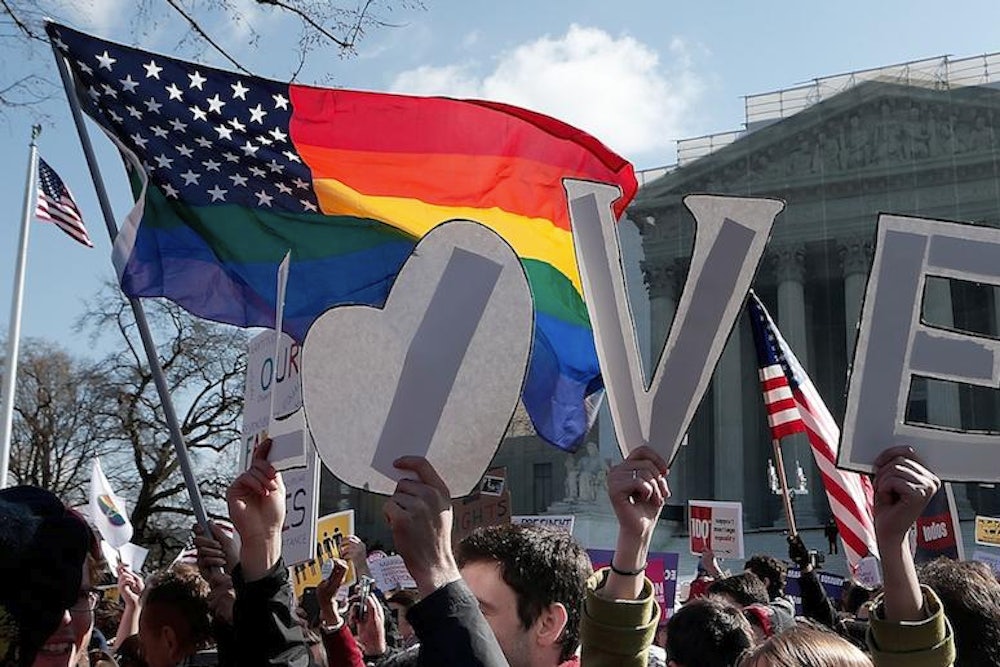Today’s Supreme Court decisions on gay marriage look a lot like the experts predicted, right down to who wrote the opinions. The Court struck down the federal Defense of Marriage Act, and it ducked the legality of California’s Proposition 8 by ruling that its proponents lacked standing to defend the law. At first glance, it’s a pretty good outcome—and it’s even better on closer look.
Many people predicted that the vote of Justice Anthony Kennedy, who wrote the decision in the DOMA case, could be won only by appealing to his conservative tendencies: DOMA, they expected him to argue, was an unconstitutional violation of states’ rights.
But Kennedy went bigger than expected in Windsor, the DOMA case, by rooting his argument in equal protection and not just federalism. It was obvious in the first few words of Justice Kennedy’s opinion, which began with Edie Windsor and Thea Spyer’s story. “When at first,” he began, “Windsor and Spyer longed to marry, neither New York nor any other State granted them that right.” [emphasis mine]
This narrative of longing was not a lead-in to a coldly technical analysis of the relative jurisdictions of the federal government and the states. No, Justice Kennedy struck down the hateful Section 3 of Defense of Marriage Act as a matter of simple justice. “DOMA seeks to injure the very class New York seeks to protect,” he wrote. “By doing so it violates basic due process and equal protection principles applicable to the Federal Government.”
Kennedy’s story of love and longing, intentional injury, and constitutional rescue in Windsor is in a direct line with his critical opinion in the first substantive gay court victory in 1996, Romer v. Evans. There, in a wrenchingly moving opinion by Kennedy, the Court threw out Colorado’s popularly enacted constitutional amendment forbidding all Colorado officials from protecting gay rights. Reminding the readers of the terrible legacy of racial segregation from Plessy v. Ferguson, Kennedy intoned, “it is not in our constitutional tradition to enact laws of this sort.” The same damning rhetoric characterizes the opinion in Windsor. After Romer, as the dissenters predicted, it was just a matter of time before the Court would decriminalize homosexual sodomy (as it did in Lawrence v. Texas), and, now, take the first big step toward protecting same sex marriage. Recognizing the emotional valence of gay “longing” is crucial to this progress.
Kennedy also incidentally signaled that he did not for a minute buy the only remaining defense of the anti-gay activists: that marriage is different from any other human condition, dictated by the law of nature or the bible. Instead, the law of the land is now that marriage is a social institution, selected by the state according to its competing feelings about longing and tradition. Neutral sounding language like “The limitation of lawful marriage to heterosexual couples, which for centuries had been deemed both necessary and fundamental, came to be seen in New York and certain other States as an unjust exclusion” masks the Court’s entry into that debate, solidly on the side of the gay-rights movement.
And it wasn’t just any old benefit: “Here the State’s decision to give this class of persons the right to marry conferred upon them a dignity and status of immense import.”
For those looking for an analogy to the race cases like Loving v. Virginia, which imposed strict scrutiny on Virginia’s anti-miscegenation law, Windsor continues the development of Kennedy’s equal protection jurisprudence. There is no talk in Windsor of discrete and insular minorities or strict or rational scrutiny or any of the other increasingly outdated legal language. Following the lead suggested in Romer by Harvard’s Larry Tribe, Kennedy simply reminds the country that it is not in our constitutional tradition to enact laws that meanly seek to make things worse for people trying to lead an ordinary human life. Regardless of how insular or discrete they are.
Reading the tea leaves from Windsor, one is tempted to speculate that had the Prop 8 case, Hollingsworth v. Perry, been decided on the merits, rather than on standing, Kennedy would have made a fifth vote to strike down Prop 8 and protect same-sex marriage in all the states. That’s what hotshot lawyers Ted Olson and David Boies said they were going to do when they started the California case all those years ago.
Maybe Hollingsworth was an honest commitment to the niceties of federal standing. But denying the Prop 8 advocates standing while extending it to the Congressional Republicans in Windsor is a little awkward. The policy argument the Court articulated to grant standing in Windsor—that the Court did not want the president to usurp their role of deciding constitutional cases by refusing to defend a law and destroying standing—applies with equal force to the California government in Hollingsworth. The Court’s role in deciding the constitutionality of state laws is as great, and almost as old, as its role in federal cases. Yet the Court just turned over to the governor of California the ability to destroy its jurisdiction to decide the constitutionality of Prop 8.
The incoherence of the two standing opinions, taken together, makes it more likely Hollingsworth was simply a decision to duck for a little while longer: There are a bunch of other direct challenges in the pipeline that don’t involve a standing problem. But the language of Windsor foretells that when the court does poke its heads over the trench it will be to make the final charge toward victory.
Linda Hirshman is the author of Victory: The Triumphant Gay Revolution, a New York Times Notable Book of 2012. She is at work on a book about Justices O’Connor, Ginsburg, and the achievement of legal equality for women.
